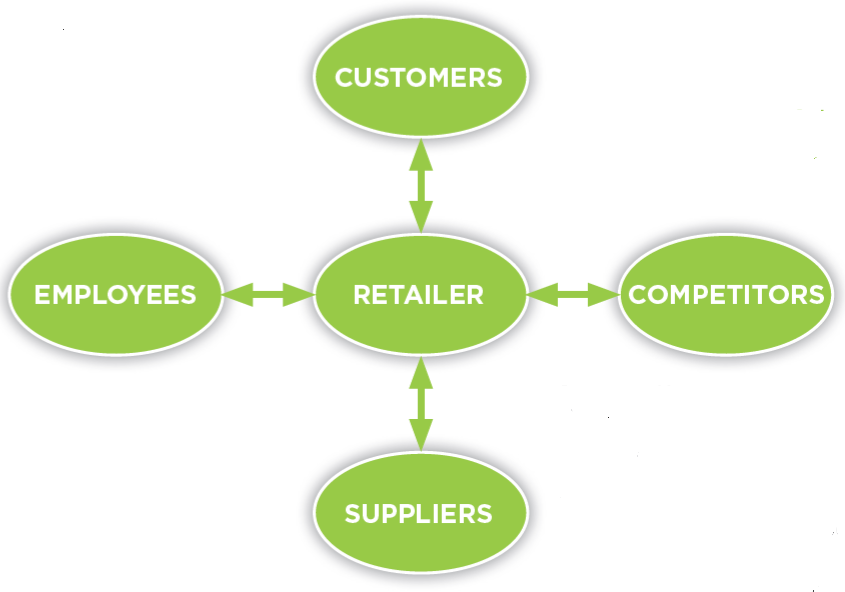In today’s unprecedented and uncertain times, it is vitally important to fully understand all the participants in the supply chain; where they are now and where they are heading. Andy Campbell explains why
The last few months have changed garden centre retail forever. Exactly how it will change remains unclear and this will only become clearer over the months ahead. The starting point is to gain clarity on how all the supply chain players are placed.
If you know yourself, your employees, customers, competitors and suppliers then you will understand your business in the widest context and ensure it is highly successful in a rapidly changing world. Let’s explore each one of these elements in turn to understand more about how they contribute to the whole.
KNOW YOURSELF
It is important to know, and be clear in your own mind, exactly why you are in business and what you want from it. This might sound like a statement of the obvious, but it is surprising the number of times this is not the case. This can result in a lack of clarity and sense of purpose throughout an organisation. Do you have a strategy for growth; are you simply seeking to maximise the return from your existing investment or do you want to get the business in the best shape for an onward sale or transfer to the next generation?
Businesses that do have clarity of purpose tend to be the more successful ones. Invariably, they find it beneficial to write it down. They use it to gain involvement and commitment within the company and adopt it when it comes to external communication. It can also be beneficial to refer to and remind yourself of during those times when you get bogged down in the detail and lose sight of the “bigger picture.”
KNOW YOUR EMPLOYEES
Do all your employees know and understand what you are seeking to achieve and how you wish to achieve it? If they do, great; if they don’t, now might be a good time to share your thoughts with them. A clear and concise aim or objective that individuals can relate to and get behind helps build a tight cohesive team all pulling in the same direction. It also enables everyone to be clear on his or her own role and how their contribution adds to the overall business objective.
Similarly, do you know the motivation of each of your employees to come to work each day? What is their particular mix of needs: reward, security, social interaction, recognition or self-esteem? Only by understanding this do you stand a chance of managing them and their expectations appropriately; allowing them to become the employees you want them to be and to behave accordingly, whilst retaining their individuality. With this combination, they will be uniquely placed to make a significant contribution to the ongoing sustainable success of the business and support you in your achievement of the business goals.
KNOW YOUR CUSTOMERS
In an ideal world, you would know exactly who they are, where they live, details about their garden, what they have bought from you, what they haven’t and why. All this requires a lot of research, data capture, storage and management as well as a great deal of time, effort and money invested in computer systems and hardware, that simply isn’t available right now. So at the very least a drive around your catchment area assessing housing stock and garden characteristics. This, coupled with some simple entry and exit research of customers visiting your centre will give you a good basic understanding of their needs and how they are changing.
Right now, it is vital to start thinking about how their shopping habits and behaviours are likely to change in the light of lockdown and social distancing and what they are likely to expect from garden retailers such as yourself in the future. By knowing and understanding your customer base inside-out, it is possible to present them with the right offer in terms of choice, quality, service and value to meet their changing expectations and requirements.
KNOW YOUR COMPETITORS
An often-overlooked element in the retail arena but, in my book, fundamental. Some garden centre locations may consider that they have little or no competition because the location they serve has no other comparable retail outlets for similar products. However, there is no room for complacency. Other players can come in, extend their own reach and selectively take volume or compete via alternative channels such as mail order and online retailing. It is a fact that the last few months have taught consumers the importance of e-commerce in their lives. The mindset of being aware but not paranoid about current and future potential competitors is healthy.

We have already looked at the importance of a clear and unambiguous set of objectives for a business and a strategy for how to achieve them. It is equally important to understand your competitors’ ambitions and strategies. Not just their actions, but also the reasons behind these actions. Why did they make that promotional decision, for example? Are they using it to lead within advertising, enhance price perception or are they simply overstocked? It is quite likely that competitors will have different goals, strategies or have assessed the customer base differently. Therefore, the right response might not simply be to follow suit. An alternative, more creative approach could be the best solution.
One thing is for certain, there is little point trying to win battles you can’t win because you are less well prepared than your competitor, or they have the upper hand due to a stronger armoury. In the case of head-on price competitiveness, deeper pockets count for a lot. Continuing with the military analogy, it is the war that is important not each and every battle.
KNOW YOUR SUPPLIERS
Just like yourselves and your competitors, the suppliers to this industry will have their own
objectives and ways of realising them. It makes sense to know what these are, on the basis that by doing business together both parties can help and support each other achieve their respective business aims. It is also important to gain an understanding of their intentions for developing the business, to enable you to select compatible suppliers that view the future very much as you do.
In addition, the supply base can be a highly valuable source of knowledge and information. This might be along the lines of consumer research, supply chain efficiency improvements or general market intelligence to name but three examples. So it makes good business sense to learn as much as you can from them. You can be sure they will be learning all they can from you.
FINAL THOUGHTS
In conclusion, what does all this ‘knowing’ add up to? It puts your business into a context and highlights the interdependency between all the participants. With a good understanding of your business objectives; how your employees can help or hinder the achievement of these; whether your customers’ needs are being met; the impact of your competitors on your own business; and how your suppliers can support you in this endeavour, your business can only be successful and go from strength to strength in these rapidly changing times. ✽
  |








